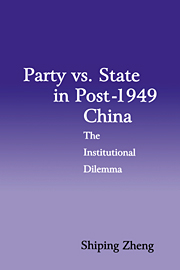Book contents
- Frontmatter
- Contents
- List of Tables
- Acknowledgments
- List of Abbreviations
- Part I Introduction
- Part II State-building under a Revolutionary Party: The Mao Zedong Era
- Part III State-building under a Reformist Party: The Deng Xiaoping Era
- 7 Reform, Legal System, and Party Rule
- 8 Changing Party–Government Relations
- 9 Military Modernization and Party Politics
- Conclusions
- Appendix A CCP Membership Changes, 1921–96
- Appendix B Campaigns in China, 1950–89
- Bibliography
- Index
9 - Military Modernization and Party Politics
Published online by Cambridge University Press: 23 September 2009
- Frontmatter
- Contents
- List of Tables
- Acknowledgments
- List of Abbreviations
- Part I Introduction
- Part II State-building under a Revolutionary Party: The Mao Zedong Era
- Part III State-building under a Reformist Party: The Deng Xiaoping Era
- 7 Reform, Legal System, and Party Rule
- 8 Changing Party–Government Relations
- 9 Military Modernization and Party Politics
- Conclusions
- Appendix A CCP Membership Changes, 1921–96
- Appendix B Campaigns in China, 1950–89
- Bibliography
- Index
Summary
MILITARY modernization was one of the fundamental issues during the Deng Xiaoping era. Deng first intended to tackle the problems in the People's Liberation Army (PLA) in 1975 when he returned from disgrace and assumed the posts of vice chairman of the Party Central Military Commission (CMC) and chief of the PLA General Staff. In January 1975, Deng pointed to two major problems in the army: factionalism and lack of discipline. He concluded that the PLA did not “act like an army.” Deng's efforts to rectify the army were soon aborted when he was purged for the second time in April 1976. After he returned to power in 1977, Deng had placed army rectification high on his agenda. In a speech to the Party CMC in August 1977, Deng, in his resumed official capacity as the new vice chairman of the Party CMC, pointed out: “Now we simply have to admit that by international standards, our science and technology have a long way to go. We must also admit that our army is not sufficiently capable of conducting modern warfare, and that although it is numerically strong, it is of relatively poor quality.” Deng's worries were mostly confirmed by the PLA's poor performance in the 1979 “punitive war” against Vietnam. The Vietnam War was for Deng what the Korean War was for Mao.
- Type
- Chapter
- Information
- Party vs. State in Post-1949 ChinaThe Institutional Dilemma, pp. 225 - 254Publisher: Cambridge University PressPrint publication year: 1997



